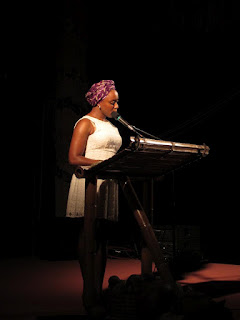"I believe quite frankly this country is at war..." Wole Soyinka's words at the unveiling of Port Harcourt as UNESCO World Book Capital 2014 during the 5th Garden City Literary Festival, re-echoed at the Rainbow Book Club’s January Reading of Chinua Achebe’s There Was a Country. The reading which held Friday 25th January at the poolside of Le Meridien, Ogeyi Place, Port Harcourt, was explosive! While Professor. Soyinka made his comments with reference to the killings of the ‘Aluu Four’ last year, the sentiments at the reading were from 1967-1970, the years of the Nigerian Civil War.
Chinua Achebe goes to great length to put the war into geographical and political context; quoting numerous sources and narrating the events in simple language, thus making his account accessible to a wide audience. This however was all but lost on the book club members who were more concerned with the content than the delivery of it. Some members felt that while Chinua Achebe is entitled to give his personal account of the war, his memoir coming forty two years later, was a bit late, opening old wounds and possibly inciting new ethnic hostilities. On the other hand, were those who felt that his book was timely, as one member questioned, ‘Has the war ended?’ He was referring to the killings done by Boko Haram. Indeed this group felt that the book was precautionary and that our leaders need to be students of history to prevent it from repeating its self.
An ex-Biafran soldier, with scars from the war front amused us with his war tales and kicked the hornet’s nest when he asserted that Ojukwu started the Biafran war. While, in his book, Achebe is careful not to lay the blame squarely on Ojukwu’s shoulders, the ex-soldier--still referring to himself as a Biafran--gave his eye-witness account, oblivious to the din his statements were causing. His was a sobering tale of suffering, famine and death.
‘War is not simple,’ said Mrs. Judy Nwanodi, whose stay in Nigeria pre-dates Independence. Aunty Judy--as she is fondly called relocated to Nigeria from England with her husband in 1958--encouraged members to read as many accounts of the war as they could, because one person’s account could not adequately capture its numerous complexities. She told of how her husband, who was actively involved in the creation of the old Rivers State, had all his law books burnt by the Biafrans and on one occasion, along with others, he was imprisoned for his own safety.
The youth, who though were not witnesses to the events in question, were surprisingly well informed on the subject. Debating the issue of meritocracy over the government quota system, the house was once again sharply divided among those who felt that meritocracy was the only way Nigeria would move forward, adding also that meritocracy would remove tribal domination. The opposing side said that it was the responsibility of government to address the social, political and economic inequalities that exist in the country, and that until these are addressed, the quota system remained a necessary evil.
Thus ended an eventful day, with more questions.




